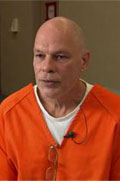
Directed by
Werner Herzog
188 minutes
Rated M
Reviewed by
Bernard Hemingway

Death Row
Synopsis: A made-for-television look at a handful of Americans awaiting state execution.Death Row is an extension of Herzog's documentary Into the Abyss which dealt with a pair of young Texans convicted of a triple homicide. Whereas the first film tended to meander over a lot of corollary information the strength of this expanded project is that each of its four segments focuses squarely on the subject. Originally made as four 47 minutes episodes for television, a common introduction notwithstanding, they are so gripping that many will take the opportunity to see them in a single sitting.
Each segment begins with the same introduction in which Herzog states that he “respectfully disagrees” with capital punishment before launching into one-on-one interviews with four men and one woman awaiting execution. We meet James Barnes who brutally murdered two women, one his wife, and who has openly claimed to have murdered two other people, perhaps more. Himself the victim of an abusive father he is seemingly a reasonable and even affable individual though clearly something is very awry with his wiring.
Hank Skinner on the other hand, who claims to have been wrongly convicted of a 1995 triple homicide is a seemingly down-to-earth character ready with a hearty laugh with Herzog over his predicament. Then comes Joseph Garcia and George Rivas, both members of a group of prisoners who escaped from a Texas maximum-security prison and who would end up killing a cop while conducting a robbery, an act which landed them all on death row due to a Texas law that holds all accomplices equally culpable. Finally, we meet Linda Carty, a black woman convicted of the 2001 murder of her neighbour.
Viewers will no doubt make varying judgements about the suitability of the death penalty as applied to these people. What is surprising is the high level of articulateness of the subjects. Another striking common characteristic is that, with the exception of Rivas, they are all in denial of one form or another.
Despite stating his position at the outset Herzog keeps a measured distance from his subjects and in no way bangs his drum. There is however one point at which he oversteps the mark. When the Texan DA who prosecuted Carty warns Herzog about humanising the woman, he replies. “I do not attempt to humanize her. She is simply a human being, period.” It is clear what the DA meant and Herzog’s rather smug response (though we know too what he meant) does her an injustice. Despite this criticism, as always with Herzog’s work, there is simple directness that makes these encounters of a most unusual kind compelling viewing.

Want more about this film?


Want something different?




